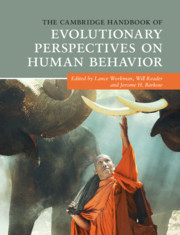Book contents
- The Cambridge Handbook of Evolutionary Perspectives on Human Behavior
- The Cambridge Handbook of Evolutionary Perspectives on Human Behavior
- Copyright page
- Dedication
- Contents
- Figures
- Tables
- Contributors
- Preface
- Acknowledgments
- Part I The Comparative Approach
- Part II Sociocultural Anthropology and Evolution
- Part III Evolution and Neuroscience
- Part IV Group Living
- Part V Evolution and Cognition
- Part VI Evolution and Development
- Part VII Sexual Selection and Human Sex Differences
- Part VIII Abnormal Behavior and Evolutionary Psychopathology
- Part IX Applying Evolutionary Principles
- 36 A Bridge Too Far?
- 37 The Evolution of Personality
- 38 Applying Evolutionary Principles to Criminality
- 39 Substitute Parenting
- 40 Historians and the Evolutionary Approach to Human Behavior
- 41 The Psychology of Extraterrestrials
- Part X Evolution and the Media
- Index
- References
41 - The Psychology of Extraterrestrials
The New Frontier?
from Part IX - Applying Evolutionary Principles
Published online by Cambridge University Press: 02 March 2020
- The Cambridge Handbook of Evolutionary Perspectives on Human Behavior
- The Cambridge Handbook of Evolutionary Perspectives on Human Behavior
- Copyright page
- Dedication
- Contents
- Figures
- Tables
- Contributors
- Preface
- Acknowledgments
- Part I The Comparative Approach
- Part II Sociocultural Anthropology and Evolution
- Part III Evolution and Neuroscience
- Part IV Group Living
- Part V Evolution and Cognition
- Part VI Evolution and Development
- Part VII Sexual Selection and Human Sex Differences
- Part VIII Abnormal Behavior and Evolutionary Psychopathology
- Part IX Applying Evolutionary Principles
- 36 A Bridge Too Far?
- 37 The Evolution of Personality
- 38 Applying Evolutionary Principles to Criminality
- 39 Substitute Parenting
- 40 Historians and the Evolutionary Approach to Human Behavior
- 41 The Psychology of Extraterrestrials
- Part X Evolution and the Media
- Index
- References
Summary
We begin with very broad strokes: if we take the Ancient Greeks and Romans as founders of Western civilization and ignore the cosmologies of the many other peoples of the world, then from Ptolemy and the first century CE until sixteenth-century Europe, the Earth was the center of the universe and all else rotated around it. With the work of Copernicus, the Earth was demoted and the sun was given the honor of centrality. But by the early twentieth century, the very notion of centrality was abolished and our sun took its place as one among a vast number of stars in an expanding universe. In similar fashion, the centrality of Homo sapiens has steadily declined. In Judeo-Christian-Islamic mythology, intelligent humans were created and given dominion over the Earth by an all-powerful deity; the only other intelligences were that deity itself and its supernatural creations: angels and demons and devils and djinns.
- Type
- Chapter
- Information
- Publisher: Cambridge University PressPrint publication year: 2020

